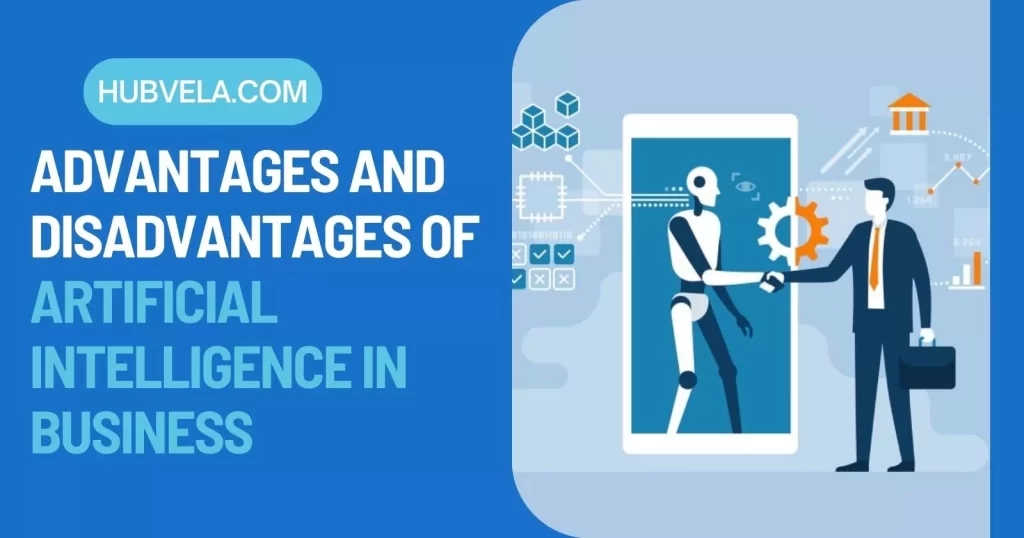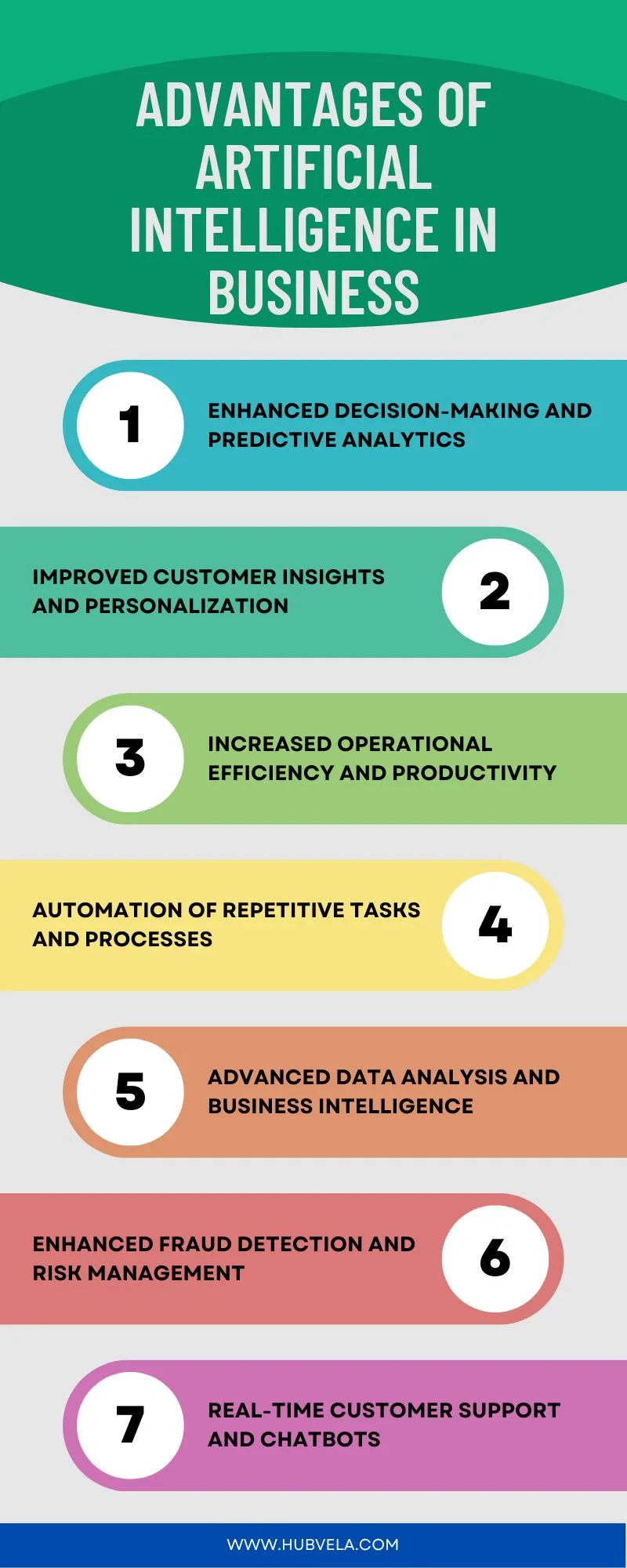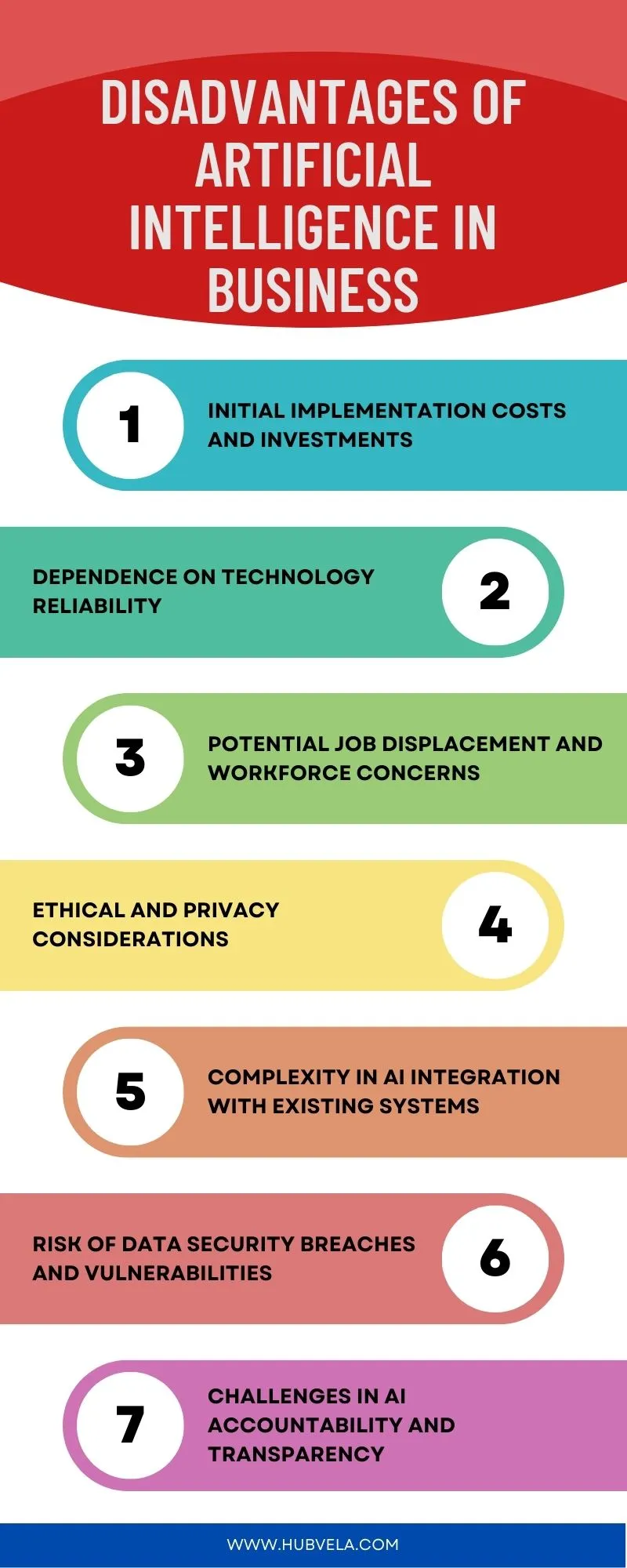Artificial Intelligence (AI) has become a buzzword in the business world. It is a simulation of human intelligence into machines to perform tasks that we would normally rely on humans.
AI has been adopted by businesses of all sizes to streamline their production processes, project gains and losses, and predict when maintenance will have to occur.
Consumers across the globe use AI in their daily lives, interacting with AI-powered virtual assistants or programs.
However, AI also has its disadvantages, such as costly implementation, potential human job loss, and lack of emotion and creativity. In this article, we will explore the advantages and disadvantages of AI in business.

--Advertisement--
Advantages of Artificial Intelligence in Business
Artificial Intelligence (AI) has become an essential tool for businesses to improve their operations, increase productivity, and enhance customer experiences.
AI can automate routine tasks, provide insights into data, and make data-driven decisions. As a result, businesses can save time and money, reduce human error, and make better decisions.
According to research firm Frost & Sullivan’s “Global State of AI, 2022” report, 87% of organizations believe AI and machine learning will help them grow revenue, boost operational efficiency, and improve customer experiences.
We will discuss the advantages of artificial intelligence in business, including how it can automate repetitive tasks and real-time customer support with AI chatbots.

1. Enhanced Decision-Making and Predictive Analytics
Artificial intelligence (AI) can provide many benefits to businesses, including enhanced decision-making and predictive analytics.
As organizations use AI to gain insights into their data, they are finding that they can make better, more accurate decisions instead of ones based on individual instincts or intuition tainted by personal biases and preferences.
AI can also help businesses predict future trends and outcomes by analyzing large amounts of data and identifying patterns and correlations.
This can be particularly useful in industries such as finance, where predictive analytics can help to identify potential risks and opportunities. The use of AI in business can lead to increased efficiency, productivity, and revenue growth.
2. Improved Customer Insights and Personalization
Improved customer insights and personalization are among the benefits of artificial intelligence (AI) in business. AI can help businesses analyze customer data and behavior to gain insights into their preferences, needs, and buying patterns.
This information can be used to personalize marketing messages, offers, and product recommendations, which can improve customer satisfaction and loyalty.
According to a report by Frost & Sullivan, 87% of organizations believe that AI and machine learning can help them improve customer experiences.
AI can also help businesses automate customer service tasks, such as answering frequently asked questions and resolving simple issues, which can free up human agents to handle more complex issues.
AI can help businesses improve their customer engagement and satisfaction by providing personalized experiences and efficient customer service.
3. Increased Operational Efficiency and Productivity
The integration of artificial intelligence (AI) into business operations has led to enhanced efficiency and productivity, allowing humans to channel their efforts towards more complex tasks.
By harnessing the power of AI technologies, businesses across industries have experienced substantial improvements in productivity.
Many businesses take up AI technology to reduce operational costs, increase efficiency, grow revenue, and improve customer experience. AI can optimize IT operations, and enhance efficiency, and performance.
Efficiency and productivity gains are two significant benefits that organizations get from using AI.
AI lets organizations handle tasks at a volume and velocity that’s simply not possible for humans to match, whether they’re using AI for search or to analyze data for insights, create software code, or execute specific business processes.
AI can increase efficiency and productivity, along with improving data analysis and customer experience thanks to predictive maintenance capabilities.
4. Automation of Repetitive Tasks and Processes
Automation of repetitive tasks and processes is one of the key benefits of artificial intelligence in business. AI enables the automation of routine, monotonous tasks such as data collection, data entry, and email responses.
This can free up employees to focus on more creative and complex problem-solving tasks, which can lead to increased productivity and improved decision-making.
Additionally, AI-powered chatbots can handle repetitive tasks across an organization, such as customer support, which can improve customer experiences.
Employing AI for business process automation can provide numerous benefits, including improved productivity, reduced human error and costs, and improved quality of work and adaptability.
However, companies need to carefully consider the challenges and benefits of using AI for their business operations and plan the implementation carefully, ensuring the security and protection of sensitive data.
5. Advanced Data Analysis and Business Intelligence
Advanced Data Analysis and Business Intelligence are two areas where Artificial Intelligence (AI) can provide significant benefits to businesses.
AI can analyze large amounts of data and provide insights that can help businesses make better decisions. AI can also help businesses identify patterns and trends that may not be immediately apparent to humans.
By automating data analysis, AI can help businesses save time and increase productivity. Additionally, AI can help businesses identify new opportunities for growth and expansion.
AI can provide businesses with a competitive advantage by helping them make better decisions, increase efficiency, and improve customer experiences.
6. Enhanced Fraud Detection and Risk Management
Enhanced Fraud Detection and Risk Management is one of the most significant advantages of Artificial Intelligence (AI) in business.
AI can help businesses detect fraudulent activities and mitigate risks by analyzing large amounts of data in real time. AI-powered fraud detection systems can identify patterns and anomalies in data that may indicate fraudulent behavior.
These systems can also learn from past incidents and improve their accuracy over time. By using AI for fraud detection and risk management, businesses can save time and resources while improving their overall security.
7. Real-Time Customer Support and Chatbots
Real-Time Customer Support and Chatbots are one of the major benefits of Artificial Intelligence in business. AI-powered chatbots can interact with customers and personalize their experiences.
They can help customers with their queries and provide them with instant solutions. Chatbots can be integrated into a wide array of software and applications to automate tasks and improve data analysis, and decision-making.
AI-powered chatbots can be available 24/7, which means customers can get their queries resolved at any time of the day. Chatbots can also help businesses reduce their customer support costs as they can handle multiple queries at the same time.
However, businesses need to be careful while using AI-powered chatbots as they can cause damage to a company’s reputation if they are not programmed properly.
Disadvantages of Artificial Intelligence in Business
Artificial Intelligence (AI) has become an integral part of businesses worldwide, providing a range of benefits such as real-time analytics, improved customer experience, and cutting costs.
However, AI also has its drawbacks, which businesses need to consider before implementing it. We will discuss the disadvantages of artificial intelligence in business.

1. Initial Implementation Costs and Investments
Implementing AI systems in business can be expensive and require specialized knowledge and resources. The initial setup for AI requires a high investment as companies have to invest in AI frameworks, including the latest hardware and software.
Ignoring the initial training process, the operation of complex or high-powered AI can also be costly. However, the cost of implementation is not the only disadvantage of AI in business.
Other disadvantages include the potential lack of human touch and creativity, the inability to think outside the box, and the potential for unemployment.
2. Dependence on Technology Reliability
One of the main disadvantages of artificial intelligence (AI) in business is the dependence on technology reliability.
AI systems need to operate on the latest hardware and software to stay updated and meet the latest requirements, thus making it quite costly.
Moreover, AI tools carry inherent cybersecurity risks with potentially serious implications for businesses, including data and privacy breaches, model poisoning and attacks, plagiarism, and copyright infringement.
Businesses utilizing AI systems need to make sure that those systems produce accurate results and are not biased.
Therefore, businesses need to invest in proper security measures, implement the right tools and policies, and educate employees to protect their AI systems from potential risks.
3. Potential Job Displacement and Workforce Concerns
Artificial Intelligence (AI) has the potential to revolutionize the way we work and improve productivity, but it also poses significant challenges, including job displacement and workforce concerns.
According to various reports, AI could lead to the loss of tens of millions of jobs. A recent Harvard study found that nearly 75% of employers rely on AI in recruiting and hiring, but that AI’s unwavering commitment to efficiency could lead to bias and discrimination.
AI systems may replace some forms of human interaction in the workplace, potentially leading to a loss of social connections and collaboration between workers.
Additionally, AI-powered job automation is a pressing concern as the technology is adopted in industries like marketing, manufacturing, and healthcare.
Eighty-five million jobs are expected to be lost to automation between 2020 and 2025, with Black and Latino employees left especially vulnerable.
As AI robots become smarter and more dexterous, the same tasks will require fewer humans. While it’s true that AI will create 97 million new jobs by 2025, many employees won’t have the skills needed for these technical roles and could be left behind.
Therefore, it is important to consider the potential job displacement and workforce concerns while implementing AI in business.
4. Ethical and Privacy Considerations
Artificial Intelligence (AI) has the potential to revolutionize the way businesses operate, but it also comes with ethical and privacy considerations.
One of the main concerns is the potential for bias in AI decision-making, which can lead to discriminatory outcomes.
Another concern is the collection and use of sensitive data, particularly in healthcare, where AI systems rely heavily on patient data.
Protecting patient privacy, maintaining data confidentiality, and preventing unauthorized access to personal health information are critical considerations.
Additionally, there is a need for transparency in how AI systems make decisions, and for accountability when things go wrong.
Companies should also consider the potential for worker displacement and invest in preparing the workforce for new roles created by AI.
Businesses should carefully consider the ethical and privacy implications of AI and take steps to mitigate any potential risks.
5. Complexity in AI Integration with Existing Systems
The integration of Artificial Intelligence (AI) with existing systems can be a complex process for businesses.
One of the main challenges is the compatibility of AI systems with legacy systems, which can be outdated and not designed to work with modern technologies.
This can result in additional costs and time-consuming efforts to upgrade or replace existing systems. Another challenge is the need for specialized skills and expertise to integrate AI systems with existing ones.
This can be a significant barrier for small and medium-sized businesses that may not have the resources to hire specialized personnel.
Furthermore, the complexity of AI integration can also lead to data privacy and security concerns, which need to be addressed to ensure the protection of sensitive information.
6. Risk of Data Security Breaches and Vulnerabilities
One of the major concerns is the risk of data security breaches and vulnerabilities. With the increasing amount of data being processed and stored by businesses, the potential for cyber-attacks and data breaches has also increased.
AI systems are not immune to these risks, and in fact, they may even be more vulnerable due to their complexity and the large amounts of data they handle.
This can lead to sensitive information being compromised, which can have serious consequences for both the business and its customers.
Therefore, it is important for businesses to take proactive measures to ensure the security of their data and AI systems, such as implementing strong encryption and access controls, regularly monitoring for vulnerabilities, and training employees on cybersecurity best practices.
7. Challenges in AI Accountability and Transparency
AI accountability and transparency are some of the significant challenges that businesses face when implementing artificial intelligence.
Transparency in AI refers to the ability to understand how an AI model reaches its decisions. The lack of transparency in AI models makes it difficult for humans to trust them, especially when it comes to delivering unbiased decisions or outputs.
Accountability is another challenge that arises when poor decisions are made, especially in the medical field. The current system requires that someone be held accountable for the consequences of AI decisions.
However, the issue of accountability is complex, and it is not always clear who is responsible when AI goes wrong.
To address these challenges, organizations need to implement AI transparency and accountability frameworks that balance competing organizational aims.
Additionally, organizations can provide training to boost AI literacy, prepare employees to identify flawed responses or behaviors in AI systems, and ensure that AI is transparent and explainable.
Conclusion on Advantages and Disadvantages of Artificial Intelligence in Business
In conclusion, Artificial intelligence has the potential to transform businesses by bringing about never-before-seen increases in efficiency and changing the way we transact, get diagnosed, perform surgeries, and drive our cars.
Employing AI technology can reduce human labor costs due to its promise of decreased manual input through automation or optimizing existing workflows – impacting how businesses both large and small will operate permanently.
AI is transforming business operations in many ways, from automating routine tasks to improving decision-making and reducing costs.
Although AI cannot solve all organizational problems, following the steps outlined in previous chapters will enable organizations to implement and excel in the use of AI technology.
To ensure AI technologies bring maximum benefit while minimizing potential risks, organizations need to carefully consider how they implement these advanced tools and create safeguards to protect against unintended consequences or misuse.
Artificial intelligence has come a long way and will surely evolve by incorporating the most basic human emotions.
AI is radically changing many industries and demands an open-minded attitude and willingness to embrace new opportunities.


